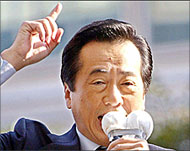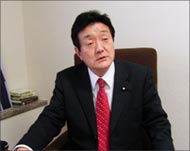Japanese sceptical over election ploys
On his recent flight back from Pyongyang, Japanese Prime Minister Junichiro Koizumi might have given himself a pat on the back.

After all, he had just secured the return of five children in North Korea who had not been allowed to rejoin their parents in Japan despite being released 19 months earlier.
Koizumi had reunited the children with their parents, who had been abducted by North Korean agents in 1978 and forced to train spies for 25 years.
Moreover, he was able to win an agreement from Kim Jong Il for a new search for 11 other Japanese nationals listed as missing as well as garner a commitment to adhere to earlier agreements on nuclear weapons.
But while his support rate in a Kyodo News poll has inched up 1.1 percentage point to 54.9%, Koizumi – with one wary eye on the Upper House election in July – will have noticed that 83.9% of the public believe the question of the Japanese abductees is unfinished business.
As the campaign posters go up, some believe that the points he earned in North Korea are cancelled out by domestic issues that have far more impact on the daily lives of the average Japanese person.
Failed reforms
Koizumi swept into power in 2001 with promises of structural reforms that would lift the country out of more than a decade of recession.
Today, even the most fervent of his supporters would point out that his reforms have stalled and the economic recovery progresses at a snail’s pace.
 |
|
Opposition leader Naoto Kan |
Both the largest opposition party and his enemies within the Liberal Democratic party can smell blood in the water. Hence, they say, his plan to shift the focus to North Korea.
“The best policy for Mr Koizumi is for him to shut up,” said Makoto Watanabe, a professor at Hokkaido University.
“The less he talks about the economy and his reform plans, the less likely it will be that the voting public realise that he’s not very knowledgeable about these issues and has no real policies.
“It is quite clear that he has failed with his plans for both the highways and postal services and has recently tried to take the spotlight off this failure by focusing on the situation involving North Korea as well as the dispatch of the forces to Iraq, where he is on relatively stronger ground,” he said.
Focus shift
After squeaking in with a slim majority in the election for the Lower House in early November, thanks largely to an alliance with the New Komeito party, Koizumi has been curiously reticent to return to the issues that he was so keen to champion in the run-up to the last vote.
Then, privatisation of Japan’s postal services and the selling off of the nation’s toll highways and bridges were pet projects that were promoted, even in the face of stiff opposition from his own party.
“He took on sections of his own party, which he called the ‘anti-reformers,’ as well as the bureaucrats; it was too much of a fight for him,” Watanabe says.
“He’s very isolated now, but the factions within the LDP that are against him are staying quiet about their victory because they know he is still the best chance they have of guaranteeing their own re-election.”
Opposition
For its part, the Democratic party believes that, after three years, Koizumi’s government has had a fair crack of the whip and should accept it has let the country down.
 |
|
Yukihisa Fujita of the Democratic |
“I still believe that the LDP is in a strong position, but for us it is important to get our message across,” says Yukihisa Fujita, who was first elected to the Diet in 1996 and is head of the DPJ’s international department.
“Like Tony Blair in Britain, I think the pressure is beginning to tell on Mr Koizumi,” Fujita said. “He’s looking tired and some of the charisma that helped him record support levels in the 70% and 80% range has gone.”
The DPJ believes that Japan’s social welfare system needs to be “rebuilt from scratch”, says Motohisa Furukawa, the DPJ’s shadow Minister of Health, Labour and Welfare, as it is failing the public.
Economic woes
Furukawa accuses the prime minister of dodging the issue by suggesting reforms in other areas, such as the constitution.
“No one believes Koizumi’s promises of fundamental reforms to the social security system to meet the needs of society,” he said.
Of broader concern, Fujita says, is the government’s insistence that the economy is recovering. “Mr Koizumi has made the nation’s economy worse,” he said. “Stock prices have risen, it’s true, but at the cost of jobs.
“The government has also spent a lot in foreign-currency trading to make sure the yen does not become cheaper,” he said. “They’re spending all that money, yet the economic outlook remains bleak.”
Pension crisis
But the party accepts it was damaged politically by the revelation in May that party president Naoto Kan failed to pay into the mandatory pension system for 10 months.
The fact that only one of the seven members of Koizumi’s cabinet who also admitted to failing to pay resigned speaks volumes for the party in power, they say.
|
“The media over-stated his image as a reformer and missed out on his nationalistic and militaristic views” Makoto Watanabe, |
Yet still the man who calls himself Lion Heart is in the driving seat.
“The media over-stated his image as a reformer and missed out on his nationalistic and militaristic views,” says Watanabe.
“People say he has changed since he has been in office, and in some areas he has been forced to as his ‘great reformer’ image has failed, but he was already far more right-wing than many of his recent predecessors.”
And since many of his reform projects have fizzled out in the face of continuing economic problems and resistance to change from the bureaucracy, he has turned his attentions to portraying himself as a supporter of the United Sates as it struggles to keep a lid on Iraq and a leader who will shed portions of a constitution that is out of date.
“Mr Koizumi is determined to make progress in foreign policy and legitimising the use of the Self-Defence Forces because his world view is simplistic,” Watanabe says.
“Three issues will dominate the run-up to the election: Iraq, the scandal over pensions and the North Korea abductees. If the DPJ can mount an effective campaign, and depending on the media’s approach, then I can see an improvement in the opposition’s standing.”
Backers
Other analysts believe he is on firmer ground.
“He played most of his cards when he went to North Korea to ensure that the five children came to Japan; that was a huge gamble,” said Noriko Hama, a professor at Kyoto’s Doshisha University.
“It could be seen as courageous and heroic by the international community, but it could equally be seen as a foolhardy and rash stunt that failed to come off,” she said.
“But in six weeks’ time this may have all been forgotten,” she added. “Mr Koizumi is very flexible and he has plenty of time to recover. Come polling day, another story will have cropped up.”